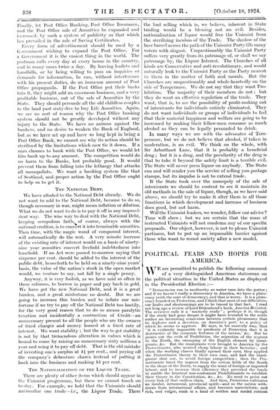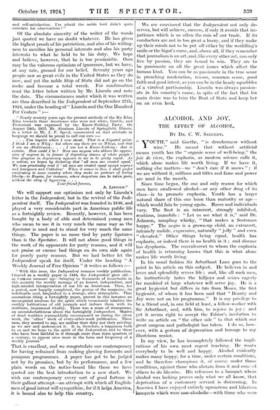POLITICAL FEARS AND HOPES FOR AMERICA.
vvE are permitted to publish the following comment of a very distinguished American statesman on the political situation in the United States as displayed in the Presidential Election :— " Democracies run to mediocrity as water runs into the gutter ; and if we haven't really a democracy in America, we have a pluto- cracy (with the cant of democracy), and that is worse. It is a pluto- cracy founded on Protection, and I think that most of our difficulties, our faults and shortcomings are to be traced to that fact. I read not long ago a review of Lord Birkenhead's book, America Revisited. The reviewer calls it a 'masterly study'; pethaps it is, though if the study had gone deeper it might have revealed to the noble author an interesting connexion between certain phenomena that he deplores and a devotion, on America's part, to a policy of which he seems to approve. Be says, in his masterly way, that it is evidently impossible to predicate of Protection that it is destructive of the economic fortunes of the nation,' &c. But he points out the evils of Prohibition, the migration of the negroes to the North, the swamping of the English element by immi- grants, Ste. But the immigrants were brought to America by the Protectionists, who wanted cheap labour in their factories ; and when the working classes finally opened their eyes, they applied the Protectionist theory to their own case, and had the immi- grants shut out, to avoid foreign competition then the Pro- tectionists lured the negroes from the cotton fields of the South to the shops of the North, to supply the want of foreign or imported labour, and to increase their efficiency they provided the funds to enable the fanatical non-conformist Prohibitionists to establish their theory in the Constitution, &c., &c. No need to point out every link of that endless chain. And then, Protection .cultivates an insular, intramural, provincial spirit—and so the nation with- draws from international affairs, and becomes materialistic, and rich, and vulgar, sunk in a kind of sodden and sordid contei4
and self-satisfaction. I'm afraid the noble lord didn't quite correlate his observations ! "
Of the absolute sincerity of the writer of the words . just quoted we have no doubt whatever. He has given the highest proofs of his patriotism, and also of his willing- ness to sacrifice his personal interests and also his party interests to what he held to be his duty. We hope and believe, however, that he is too pessimistic. Ours may be the valorous optimism of ignorance, but we have, at any rate, ground for our belief. Seventy years ago people saw as great evils in the United States as they do now, and yet the noble Ship of State did not go on the rocks and become a total wreck. For confirmation read the letter below written by Mr. Lincoln and note the date. The circumstances under which it was written are thus described in the Independent of September 27th, 1924, under the heading of" Lincoln and the One Hundred Per Centers" :— " Nearly seventy years ago the present attitude of the Ku Klux Klan towards those Americans who were not white, Gentile, and Protestant was expressed by the Know-Nothing Party. On August 24th, 1855, Mr. Abraham Lincoln of Springfield, Illinois, in a letter to Mr. 3. F. Speed, commented on that attitude in language we should be proud to call our own
. . You inquire where I now stand. That is a disputed point. I think I am a Whig : but others say there are no Whigs, and that
I am an . . . I am not a Know-Nothing : that is certain. HOW could I be ? How can anyone who abhors the oppres- sion. of negroes be in. favour of degrading classes of white people! Our progress in degeneracy appears to me to be pretty rapid. As a nation, we began by declaring that all men, are created equal.' We now practically read it 'all men are created equal except negroes and foreigners and Catholics.' When it comes to this, I shall prefer emigrating to some country where they make no pretence. of loving liberty—to Russia, for instance, where despotism can be taken pure, without the alloy of hypocrisy. . . .
Your, friend forever, A. Li:geol./kr."
We will support our optimism not only by Lincoln's letter in tie Independent, but in the revival of the Inde- pendent itself. The Independent was founded in 1848, and played a very considerable part in American public life as a fortnightly review. Recently, however, it has been bought by a body of able and determined young men who mean to use it in very much the same way as the Spectator is used and to stand for very much the same things. The paper is no more tied by party ligatures than is the Spectator. It will not abuse good things in the work of its opponents for patty reasons, and it will not praise or excuse bad things on its own side again for purely party reasons. But we had better let the Independent speak for itself. Under the heading "A Weekly Journal of Free Opinion" it writes as follows :— "With this issue, the Independent resumes weekly publication. Created as a weekly paper in 1848, the Independent grew old— as I urams measure age—bringing to thousands of households in this country the weekly message of an honest, independent, and high-minded interpretation of our life as Americans. Then, for a period, now happily completed, the genius of the magazine, its indefinable soul, languished in' a strange, alien atmosphere. That anomalona thing, a fortnightly paper, proved in this instance an uncongenial medium for the spirit which tenaciously inhabits the earthly habitations of old journals and imbues them with its stubborn, impersonal vitality. There was a sense of strangeness, an uncomfortableness about the fortnightly Independent. Shades of dead worthies reproachfully encompassed us during the silent week, the 'other week of every-other-week publication. These men, they seemed to say, see neither their duty nor their privilege as we saw and understood it. It is, therefore, a happiness both to us and we hope to the spirit of the Independent, and to those who. have been faithful to it through zero than three quarters of a century, to appear once more in the form and frequency of a weekly journaL" That is excellent, and we congratulate our contemporary for having refrained from making glowing forecasts and pompous programmes. A paper has got to be judged not by its promises, but by its performance, and a few plain words on the notice-board like those we have quoted are the best introduction to a new start. We wish our contemporary every sort of good fortune in their gallant attempt—an attempt with which all English- . men.of goad intent will sympathize, for if it helps America, it is bound also- to help this country. We are convinced that the Independent not only de- serves, but will achieve, success, if only it avoids that im- patience which is so often the ruin or our trade. If its conductors are not in too great a huiry, and if they make up their minds not to be put off either by the worldling's smile or the bigot's curse, and, above all, if they remember that journalism is an art, and, like every other art, can only live by passion, they are bound to win. They are to be passionate on all the great issues which affect the human kind. You can be as passionate in the true sense in preaching moderation, reason, common sense, good faith and good intent, as you can be in the heady squabbles of a virulent partisanship. Lincoln was always passion- ate in his country's cause, in spite of the fact that his main desire was to trim the Boat of State and keep her on an even keel.



























































 Previous page
Previous page